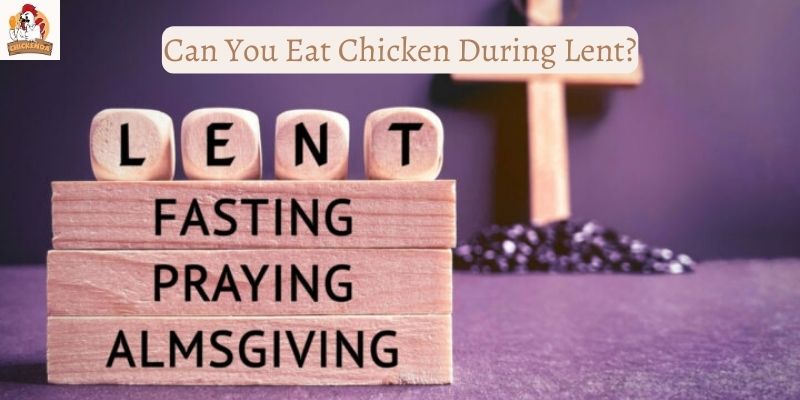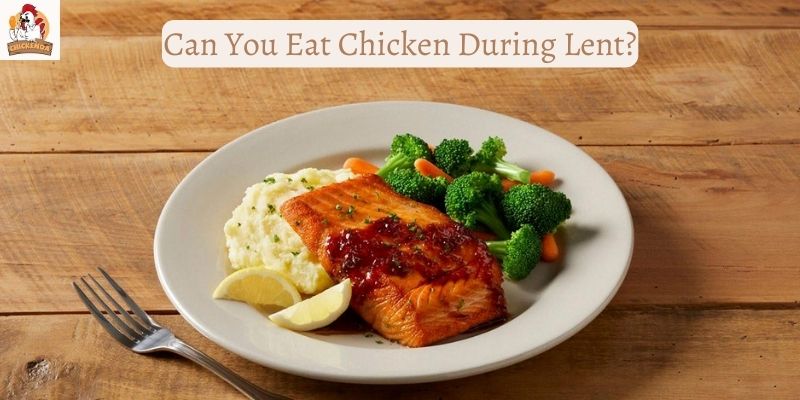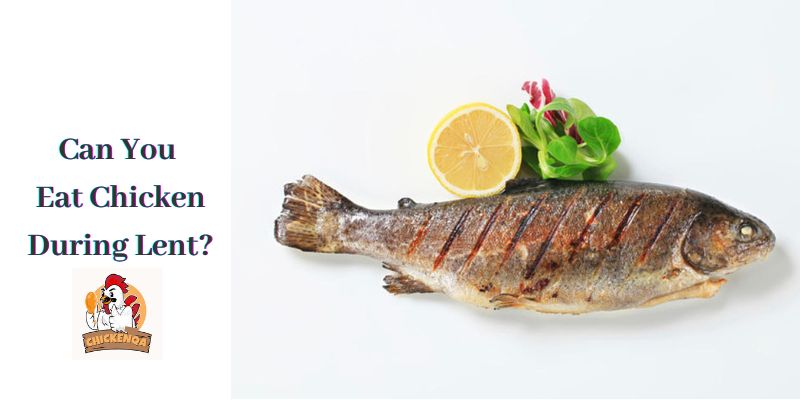Can You Eat Chicken During Lent? The Roman Catholic church advises Christians to abstain from eating meat, especially chicken, during Lent, specifically on Ash Wednesday, Lenten Fridays, and Good Friday, in order to prepare for Easter Sunday. People act in this way because they think Jesus gave up his flesh for them. They don’t eat flesh like meat as a result.
Importantly, there are a few exceptions to who should observe the prohibition against eating meat, which only strictly applies on Ash Wednesday, Lenten Fridays, and Good Friday. Christians can choose plant-based meat and shellfish without backbones instead of animal meat like beef and chicken, such as prawns, squid, clams, mussels, and lobster meat. Additionally, some adherents emphasize the consumption of wholesome meals like fruits and vegetables.
Continue reading to learn with Chickenqa.com about Can You Eat Chicken During Lent, the dietary restrictions that apply during this holiday, and related subjects.
What is Lent?

Lent is the 40-day period that comes before Easter according to the Christian calendar. Lent, a period for meditation and preparing for Easter celebrations, begins on Ash Wednesday. To commemorate the death of Jesus Christ and his forty-day fast in the desert, Christians observe Lent for 40 days. A distinctive characteristic of Lent is abstinence from eating and festivities. During Lent, we reflect on the events that preceded
Jesus’ execution by the Romans. On the other hand, Easter is a moment to reflect on the fact that Jesus died on the cross and then rose from the dead. Roman Catholic Christians think that the sacrifice took place in Jerusalem when it was under Roman rule.
Holy Week is the name given to the final week of the Lenten season. There are a number of holy days this week that celebrate their depiction. Palm Sunday, Holy Wednesday, Maundy Thursday, Good Friday, and Holy Saturday, sometimes known as Black Saturday and Easter Sunday are among them.
Christians refrain from eating meat in remembrance of the supreme sacrifice and penance, and they strive to get closer to God by abstaining from vices and other enjoyable activities.
Can You Eat Chicken During Lent?

If you still wonder “Can You Eat Chicken During Lent”, the answer is nope. Catholics fast, which means that on Ash Wednesday and Good Friday, they eat less than usual. Adults frequently give up snacking and stick to one large meal and two smaller ones each day.
On Ash Wednesday, Good Friday, and every Friday throughout Lent, Catholic adults over the age of 14 abstain from eating meat, including chicken. Today, the bulk of meats, including lamb, chicken, cattle, hogs, gammon, and deer, are prohibited. However, foods like eggs, milk, shellfish, cereals, fruits, and vegetables are all acceptable to eat.
There are exceptions. For instance, persons who are expecting, ill, elderly, or very young are exempt from Lent’s fasting restrictions. Many others also give something up for the length of Lent. Others abstain from a favorite food, such as chocolate or chicken, while some Catholics refrain from vices like watching TV. If you are fasting from meat or other meals for Lent, you won’t be able to eat them during the 40 days that come after Ash Wednesday.
The Origin of the Friday Chicken Fast Through Lent
Christian believers observe Lent, which lasts for 40 days. It starts on Ash Wednesday and lasts until Easter Sunday. Many Christians forego a favorite food or vice during Lent. Examples include chocolate and cigarettes. Additionally, some people decide to abstain from meat for the full 40 days. It has long been customary to abstain from meat on Fridays during Lent. It is thought that it got its origin in the early church as a method to emulate Jesus’ offering up of his flesh for 40 days in the desert. In 1215, the Catholic Church formally endorsed the custom.
Many individuals today still refrain from eating chicken on Fridays even if they don’t observe Lent. This can be due to the fact that it has developed into a cultural practice or because it is regarded as a beneficial approach to consuming less meat in general.
How to Eat During Fasting?

Catholics fast, which means they consume fewer calories than usual, on Ash Wednesday and Good Friday. Adults typically stop snacking and limit their daily meals to one main meal and two smaller ones. Catholics over the age of 14 who are adults also refrain from eating meat on Ash Wednesday, Good Friday, and every Friday during Lent. Lamb, chicken, beef, hog, gammon, deer, and the majority of other meats are not permitted to be consumed during these times. Eggs, milk, fish, grains, fruits, and vegetables are all permitted, though.
Many others also abstain from something for the duration of Lent. Some Catholics abstain from a favorite food, like chocolate or chicken, while others abstain from a habit, like watching TV. You won’t be able to consume meat or other foods during Ash Wednesday and the ensuing 40 days if you are giving them up for Lent.
What Alternatives Are There to Eat During Lent?
Many individuals still observe Good Friday, despite the fact that its significance has evolved throughout time.
For those who want to keep things simple, fish is always a great option. Whitefish that is both delicate and flaky, like cod or halibut, may be served in a variety of ways and pairs nicely with most sides. Another popular choice is vegetarian lasagna. This dish is perfect for Meatless Friday as a hearty and filling main course.
Here are some ideas for meals you can eat on Good Friday to help you sate your appetite without breaking your fast:

1. Fish: On Good Friday, seafood was traditionally eaten in many civilizations. Enjoy some fish or shellfish if you’d like!
2. Vegetables: There are a tonne of delectable recipes with vegetables as the main ingredient. Choose whether to try something new or stick with your tried and true options.
3. Grains and legumes: can be utilized to create filling soups and stews. Alternately, consider quinoa or lentils as an alternative.
4. Fruit: Fresh fruit is a dependably healthy option because there are many ways to incorporate it into meals and snacks.
5. Dairy: This component is suitable for both savoury and sweet dishes. Make a smoothie, a fruit pie, or a creamy spaghetti sauce.
6. Starches: Rice, potatoes, baked goods, noodles, and baked foods are all fantastic choices.
7. Desserts: Try to manage your portion amounts even though they can be delicious.
Are you still unsure of what to prepare and eat for Good Friday? Why not make an experiment? There are a tonne of recipes for creative meatless foods from various cultures online.
Who is exempt from the rules of the Lenten fast?
According to Catholic Lent guidelines, refraining from meat and fasting for a few meals really isn’t that much of a hardship for the majority of people. The Catholic fasting regulations, however, may cause major health issues for some people. If that applies to you, relax.
There are many exceptions offered by the Catholic Church. For instance, no one of the following is required to fast or abstain during Lent:
- Children
- Someone who is 60 years or older
- women who are Pregnant or breastfeeding
- Those who are weak
- Those who are “unsound of mind”
- Manual laborers who require food to stay energized while working
- People with health conditions (such as diabetes) that prevent them from fasting or abstaining
Even visitors whose refusal to consume food would considerably anger their dinner host! Are you eligible for a dispensation? If so, it is entirely up to you and God how strictly you observe the Lent fasting rules.
He and you both are aware of whether you should actually be exempt from spiritual fasting or if you are merely attempting to avoid it.
Remember that there are many other things you may give up for Lent if you are unable to fast.
What are The Benefits of Lent? 6 Notes

1. Making up for sin
Since Lent has been regarded as penitential, the church has mandated it as a time for believers to practice penance and mortification in order to atone for their sins. Since fasting is now understood to be a necessary component of repentance, lent is a time to encourage people to turn away from sin and toward God.
In this instance, practicing penance entails expressing regret for having offended God and others as well as working to right the wrongs that have been done.
2. To Advance Spiritually
Fasting has long been acknowledged as a form of penance. The use of fasting for spiritual purposes has been underutilized in the post-modern era. Thus, the physical advantages of fasting have gained more attention, while the spiritual advantages have been woefully undervalued.
Christians still acknowledge that fasting is the key to staying spiritually relevant in today’s world. A person can maintain their spiritual relevance by fasting. Many people have viewed fasting’s physical advantages as shortsighted, pagan practices that are out of step with eternal life.
3. Fasting Aids in the Suppression of Feminine Lust
Fasting is the best approach for Christians to restrain the fleshly lusts that cause them to sin. We should fast so that the mind can contemplate divine things with greater freedom. One way to obtain revelations from above and to stifle wicked inclinations is by fasting. Fasting brings people to their lowest level, where it can be difficult to be controlled by wicked urges.
The control of the soul over the body is facilitated by fasting. Christians who participated in spiritual perfection through fasting frequently feel God’s presence. Fasting is a form of self-sacrifice that encourages us to focus more on God’s plan for our life.
4. Fasting forces us to face our transgressions and make amends with God.
Making amends with God begins with accepting responsibility for your sins. Your route to meeting God will be cleared once you make reparations. We will eventually develop resistance against sin and other earthly temptations as we own up to our sins and make atonement with God. Fasting allows us to successfully coerce the body into submission.
5. Fasting Promotes Self-Control
Fasting helps us develop self-control since we can make the body comply. We shall impose self-mastery when we make our bodies follow God’s commands. These qualities are essential to living as Christians.
It is important for us to remember that the wants of the flesh constantly conflict with those of the spirit. By fasting, we can correct the imbalance between our flesh and spirit and submit to the control of the spirit.
6. Fasting Strengthens Our Prayer
Fasting will sharpen our intellect so that we can understand God better, and it will assist us to purify our minds so that we can see God’s magnificent beauty and truth. God always views our willingness to endure as a sign of our deep love for him.
FAQs about Fasting during Lent day
1. What Else Is Banned Throughout Lent?
Generally speaking, there are a few things that are off-limits during Lent. Some examples include indulging in meat on Fridays, consuming beer, smoking cigarettes, and engaging in other gluttonous behaviors. Other things that some Christians opt to forgo include things like chocolate and coffee that they view as indulgences.
2. Why is it okay to eat fish during Lent but not chicken?
Since fish isn’t directly stated in the Bible as an animal that should be avoided, it is regarded as a loophole. But chicken is regarded as a species of poultry that is expressly mentioned on the list of creatures to stay away from. Therefore, the Church’s position is that during Lent, you can eat fish but not chicken.
On Fridays, some people might decide to forgo all meat, while others might limit their meat consumption to red and poultry. Fish is typically regarded as a more palatable choice because it isn’t as closely linked to the killing of an animal.
3. Why is chicken off-limits during Lent yet eggs are allowed?
The short explanation is that because chicken is meat, it is not permitted during Lent. On the other hand, since eggs do not come from animals that are murdered for their meat, they are not regarded as being meat.
4. What will happen if I forget about fasting on Fridays and consume meat?
Simply cease eating your meat (immediately or as soon as you realize it) and adhere to the rules for the remainder of the day if you forget and eat meat on a Friday during Lent. I wouldn’t worry too much unless you bring it up again the next time you go to confession. It’s not a sin to forget as long as it was truly an accident. Everybody experiences it!
Conclusion:
Catholics used to be compelled to abstain from eating anything on Fridays during Lent, as well as to fast for set amounts of time. But nowadays, it’s much simpler to observe Lent, and many Catholics are free to engage in a wide range of activities over this penitential period. For instance, some Catholics may choose to merely abstain from red meat or fowl on Fridays rather than all meat. Thank you for reading our article Can You Eat Chicken During Lent, let’s check our blog to find other answers to chicken questions.


